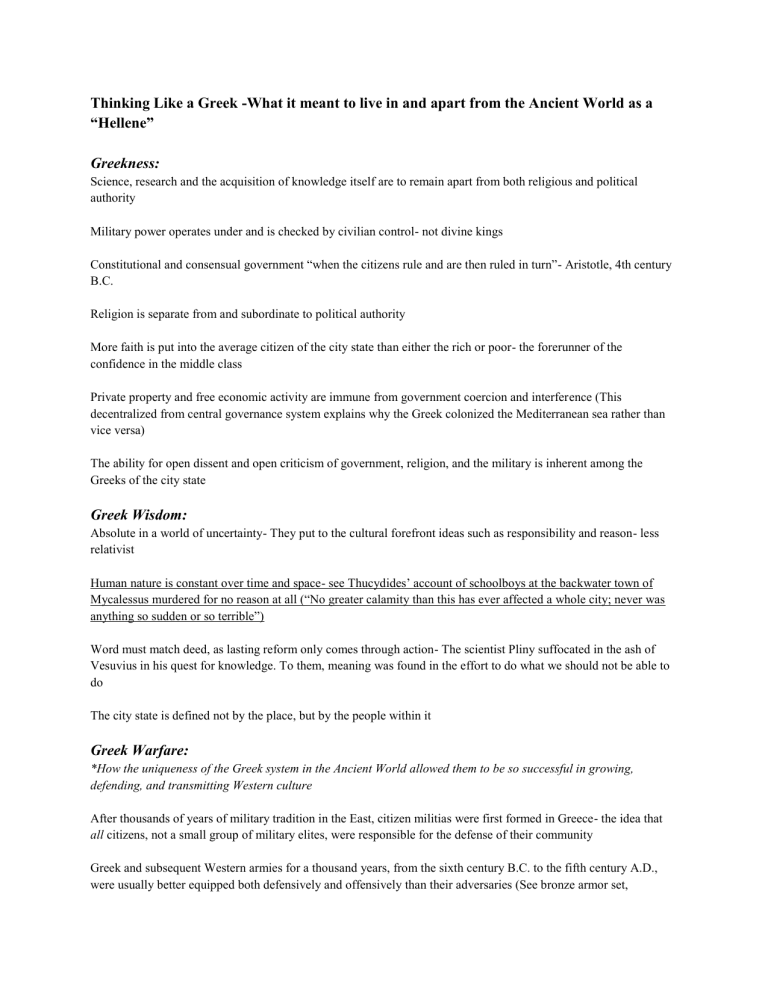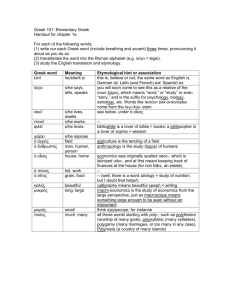
Thinking Like a Greek -What it meant to live in and apart from the Ancient World as a “Hellene” Greekness: Science, research and the acquisition of knowledge itself are to remain apart from both religious and political authority Military power operates under and is checked by civilian control- not divine kings Constitutional and consensual government “when the citizens rule and are then ruled in turn”- Aristotle, 4th century B.C. Religion is separate from and subordinate to political authority More faith is put into the average citizen of the city state than either the rich or poor- the forerunner of the confidence in the middle class Private property and free economic activity are immune from government coercion and interference (This decentralized from central governance system explains why the Greek colonized the Mediterranean sea rather than vice versa) The ability for open dissent and open criticism of government, religion, and the military is inherent among the Greeks of the city state Greek Wisdom: Absolute in a world of uncertainty- They put to the cultural forefront ideas such as responsibility and reason- less relativist Human nature is constant over time and space- see Thucydides’ account of schoolboys at the backwater town of Mycalessus murdered for no reason at all (“No greater calamity than this has ever affected a whole city; never was anything so sudden or so terrible”) Word must match deed, as lasting reform only comes through action- The scientist Pliny suffocated in the ash of Vesuvius in his quest for knowledge. To them, meaning was found in the effort to do what we should not be able to do The city state is defined not by the place, but by the people within it Greek Warfare: *How the uniqueness of the Greek system in the Ancient World allowed them to be so successful in growing, defending, and transmitting Western culture After thousands of years of military tradition in the East, citizen militias were first formed in Greece- the idea that all citizens, not a small group of military elites, were responsible for the defense of their community Greek and subsequent Western armies for a thousand years, from the sixth century B.C. to the fifth century A.D., were usually better equipped both defensively and offensively than their adversaries (See bronze armor set, Macedonian Sarissa)...Superior military technology was the inevitable result of a pragmatic society where the marketplace of ideas and science was largely unhindered by religious coercion and state suppression Superior military discipline was the result of a society where constitutional government had grown the need to follow the law, not a single individual- this resulted in greater discipline in the face of overwhelming numbers. A puzzled King of Kings, Xerxes, is told “Law is their master, whom they fear much more than your men fear you,”. Draft resistance, attacks on commanders, infighting on the battle line, and mass panic in the face of overwhelming odds were the exceptions and not the rule Once threatened militarily with the unknown, Greece (and Rome) usually matched and transformed any foreign innovation they encountered. This could be technological, tactical, or strategic- The Graeco-Persian as well as Punic Wars are evidence of this as they both started as invasions of Europe and ended in disaster in Asia and Africa Effective military response was a result of human nature and a culture that was largely decentralized from the government, free from religious dogma that was authoritarian

